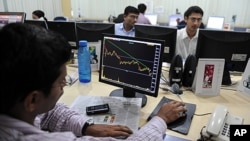India is hoping to attract more overseas funds as it opens its stock markets to individual foreign investors for the first time, but it may not be easy as the allure of the Indian stock markets fades amid a faltering economy.
Starting January 15, the government has announced that individual foreign investors can directly buy and sell Indian equities. Earlier, they could only invest through mutual funds or institutional investors.
Officials hope the move will reverse last year's trend that saw foreign investors pulling out billions of dollars from the Indian economy. The government also wants to reduce market volatility.
But many economists say it is not likely to have an immediate impact at a time when Indian equities have been ranked among the world’s worst performers after losing as much as one quarter of their value in the last year.
Anushree Sinha is an economist at the National Council of Applied Economic Research.
“If the market is not very healthy, then the investors will worry, and I don’t think it will happen so smoothly, Sinha stated. "So I think we will have to put our house in order to get foreign investment.”
In 2011, net foreign inflows in the Indian markets added up to a paltry $380 million compared to $29 billion in 2010. That is bad news for a country that has relied heavily on such foreign investment for liquidity.
The European debt crisis and sluggish Western economies were blamed for the drop in outside investors, but domestic factors also played a role.
Last year in India inflation remained high and growth began to plummet following a series of interest rate hikes. The rupee hit a record low against the dollar and has depreciated by nearly 20 percent in the last six months.
Economist Sinha says economic growth will clearly not reach the nine per cent level the government had forecast at the start of 2011. “The last year will see a major slowdown. They expected to curb inflation and improve growth which just did not happen," he explained. "They were trying to reduce demand in an excessive manner.”
India is ranked as one of the world’s fastest growing economies, but analysts say recent months have shown the global economic slowdown has been taking its toll.




